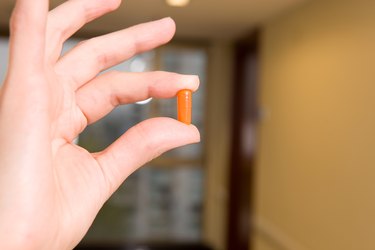
Iron supplements are beneficial for people with iron deficiency anemia, who don't get adequate amounts of iron in their diet or who simply need extra iron during a certain life stage. However, the National Digestive Diseases Information Clearinghouse, or NDDIC, states that men are more at risk for a hereditary condition that causes excess iron to build up in the vital organs. Adult men should not take iron supplements unless recommended to do so by a doctor.
Understanding Hemochromatosis
Video of the Day
Excess amounts of iron–iron overload–can result in many diseases, the most common of which is hemochromatosis, says the NDDIC. Primary hemochromatosis is hereditary in nature, while secondary hemochromatosis can be the result of alcoholism, anemia and other medical disorders. Although either gender can have hereditary hemochromatosis, it's more commonly seen in men, who are more likely to be diagnosed at a younger age. The NDDIC indicates that most men begin to exhibit symptoms of hemochromatosis between the ages of 30 and 50, whereas women are usually diagnosed around the age of 50.
Video of the Day
Prevalence
Hereditary hemochromatosis is most common in caucasians of Northern European descent, with around five out of every 1,000 people affected, says the NDDIC. Hemochromatosis is less likely to affect men of Asian American, Hispanic, American Indian and African American descent.
Excess Iron in Men
Men who are predisposed to hemochromatosis can build up potentially toxic and even lethal amounts of iron in their vital organs and other glands, states the Iron Disorders Institute. Excess iron in men can cause tissue damage, premature aging and DNA mutations that can cause cancer.
When combined with other catalysts, such as diabetes, smoking, high cholesterol, heart disease or alcohol consumption, too much iron can be extremely dangerous. Excess iron affects numerous vital organs, such as the heart and liver, as well as the pancreas, thyroid, adrenals and organs that produce sex hormones. Men with excess iron can also get impotence, a flagging libido, decreased muscle mass and body hair, lethargy and joint pain, among a host of other symptoms.
Need for Iron
Compared to adult women, men generally require less iron during the course of their lifetimes. Male and female infants between the ages of seven months to one year of age need 11 mg of iron each day, states the University of Maryland Medical Center, or UMMC. This amount decreases during childhood and increases again during adolescence, when males between the ages of 14 to 18 years require 11 mg of iron–the same amount needed during infancy.
However, men 19 years of age and older need only 8 mg of iron each day, a modest amount compared to pregnant people, who require 27 mg of daily iron. The Office of Dietary Supplements advises getting your daily iron from the food you eat rather than supplements.
Iron Supplement Cautions
The good news is that the metabolism of most men only allows for the requisite amount of iron to be absorbed, despite copious consumption of red meat and other unhealthy habits, says the Iron Disorders Institute. Iron supplements may be appropriate for men with iron deficiency anemia or those who eat an iron-poor diet. However, regardless or age or gender, the UMMC advises that iron supplements be taken only on the recommendation of a doctor due to potential complications associated with excess iron. Always talk to your treating physician before taking iron supplements.